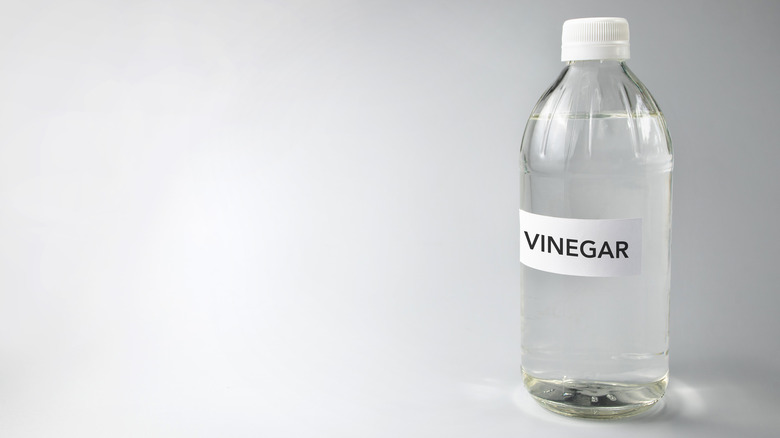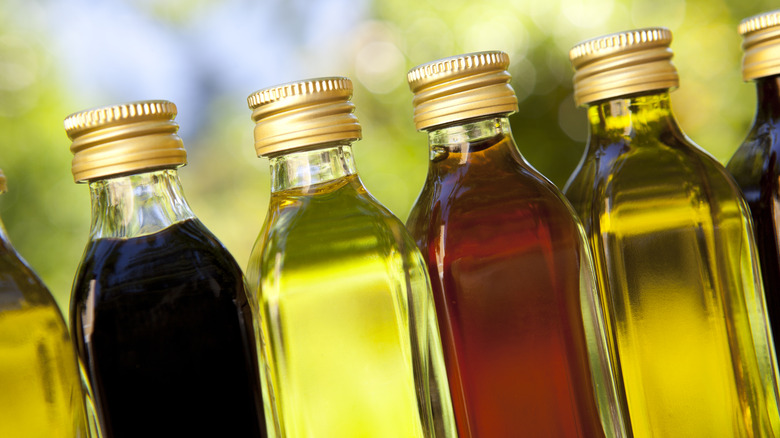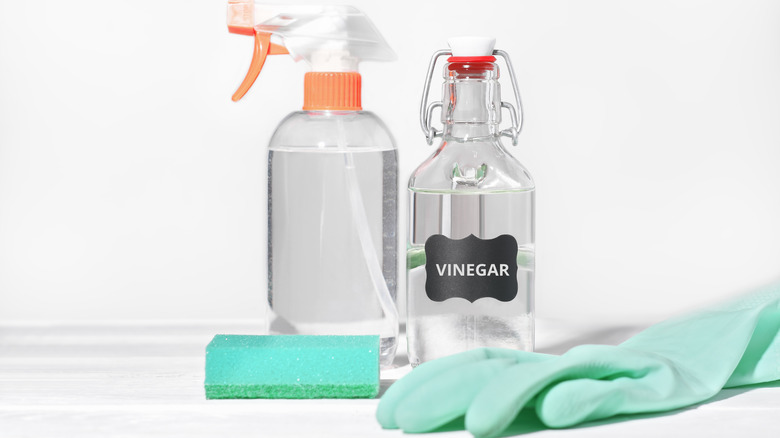How Long Does White Vinegar Usually Last?
Even if you haven't lived in your current home very long, we'd put money down that you likely have some mysterious, forgotten ingredients at the back of your pantry. If you're the proud owner of a jug of white vinegar that may be older than you are, you're likely wondering if it's still good to use, or if you'd be better off pouring it down the sink.
The good news is that vinegar doesn't go bad, ever — being that it's a fermented product, vinegar isn't capable of spoiling the way fresh produce, meats, or dairy would. Its shelf life is considered almost indefinite, so even if you cook with vinegar that dates back to who-knows-when, the chances are virtually nil that it'll make you sick. Vinegar is a self-preserving product thanks to its acidity (it typically has a pH of 2-3), which provides natural antimicrobial properties.
And while some different kinds of vinegar may undergo some cosmetic changes, such as in color or clarity, white vinegar typically stays exactly as it is, with no refrigeration necessary. The only thing to keep in mind is that over long periods, vinegar will gradually begin to lose some of its acidity. But rest assured, there's no point at which vinegar "turns bad," it just might be a little less flavorful or effective, depending on how you're using it.
Flavor saver
Though vinegar doesn't go bad, per se, some kinds of vinegar may start to degrade in flavor or appearance over long periods. That's what the "best buy" date printed on each bottle refers to — after that point, the vinegar won't be bad, it just won't be ... as good. Balsamic, red wine, and rice wine vinegar are all best consumed within 2-3 years, to ensure that they still taste and look as good as possible (although it's said that in some cases, balsamic vinegar improves with age). For apple cider vinegar, the optimal window is within five years. But for distilled white vinegar, it's basically forever.
Over long periods of time (we're talking several years), though, even white vinegar can become cloudy and its taste may change. It'll still be perfectly safe to consume, but if the altered appearance or flavor is impacting your recipes in a way you don't like, it might be time to pick up a new bottle. But don't toss that old one; there are still plenty of uses for it.
Vinegar pHorever
Vinegar is commonly used to give some zing to all sorts of recipes, but if you have a jug that doesn't look or taste particularly fresh and you'd rather not put it in food, don't trash it just yet. The same antimicrobial properties that keep vinegar from spoiling are also what make white vinegar a useful cleaning product or even a disinfectant to treat wounds. That old jug of white vinegar lurking in your cabinet can be diluted and used as a natural household cleaner to break up grease or gunk on surfaces such as windows, walls, floors, sinks, and even stovetops and coffeemakers (provided none of those are made of aluminum, cast iron, stone, or waxed wood).
Don't rely on your oven to self-clean; instead, try a little vinegar in conjunction with baking soda to help defeat those crusty, baked-on stains. You can use vinegar to clear out your sink drain after an oil spill, or to remove mineral buildup from faucets, or get the shiniest, cleanest drinking glasses of your life. Just keep in mind that for areas that come into direct contact with raw food, such as cutting boards, you're better off using bleach solution or a commercial cleanser than a homemade vinegar solution alone, to ensure that the surface is thoroughly disinfected.


